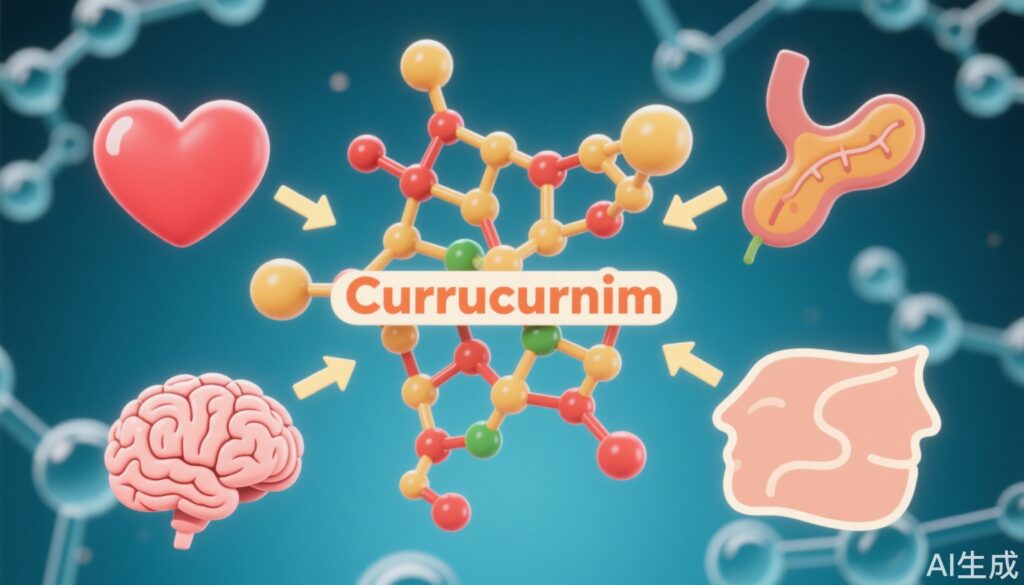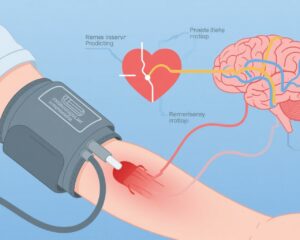Highlights
- Curcumin supplementation shows moderate- to high-quality evidence for reducing cardiovascular risk factors based on a large meta-analysis of micronutrients.
- A landmark randomized controlled trial demonstrated curcumin’s efficacy in preventing progression from prediabetes to type 2 diabetes by preserving β-cell function and improving insulin resistance.
- Preclinical and early clinical evidence suggest curcumin’s neuroprotective and anti-inflammatory effects may benefit cognitive function, aging processes, and neurodegenerative disorders.
- Curcumin’s pleiotropic mechanisms—including antioxidant, anti-inflammatory, and metabolic modulation—underpin its translational therapeutic potential across multiple chronic diseases.
Background
Curcumin, a polyphenolic compound derived from the rhizome of Curcuma longa (turmeric), has been extensively studied for its wide-ranging pharmacological properties. Given the global burden of cardiovascular disease (CVD), type 2 diabetes mellitus (T2DM), cognitive decline, aging, and neurodegenerative diseases, there is burgeoning interest in safe, dietary-derived adjunct therapies with pleiotropic benefits. The clinical translation of curcumin supplementation requires integration of evidence from randomized controlled trials (RCTs), meta-analyses, and mechanistic studies to inform therapeutic applications.
Key Content
Curcumin and Cardiovascular Disease Risk Reduction
A comprehensive and recent systematic review and meta-analysis published in 2022 (PMID: 36480969) evaluated 884 RCTs encompassing 27 micronutrients, including curcumin, among 883,627 participants to quantify cardiometabolic effects. Curcumin supplementation demonstrated moderate- to high-quality evidence for reducing cardiovascular risk factors, such as markers of oxidative stress and inflammation, contributing to improved vascular function. Although direct effects on hard endpoints like myocardial infarction or mortality require further dedicated trials, curcumin’s antioxidant and endothelial protective effects are biologically plausible to mitigate atherogenesis.
This analysis corroborates other micronutrients like n-3 fatty acids, folic acid, and coenzyme Q10 as beneficial in CVD risk mitigation. Notably, vitamins C, D, E, and selenium lacked consistent cardiovascular or diabetes risk benefit in this dataset. Curcumin’s inclusion highlights its potential as a complementary agent within cardiometabolic health frameworks.
Curcumin in Prevention and Management of Type 2 Diabetes Mellitus
A pivotal double-blinded placebo-controlled RCT conducted in 2012 (PMID: 22773702) assessed curcumin’s efficacy in delaying T2DM onset among 240 prediabetic individuals. Over 9 months, curcumin supplementation completely prevented progression to T2DM, versus a 16.4% incidence in placebo controls.
Mechanistically, curcumin improved pancreatic β-cell function, reflected by increased HOMA-β scores and lowered C-peptide levels, indicative of improved insulin secretory dynamics without hypersecretion. It concurrently reduced insulin resistance (evaluated by HOMA-IR) and elevated adiponectin, an anti-inflammatory cytokine associated with insulin sensitivity. Safety profile was excellent with minimal adverse effects.
This landmark trial establishes curcumin as an effective intervention to modify diabetes pathophysiology during the prediabetic stage, underscoring its metabolic regulatory and anti-inflammatory properties.
Emerging Evidence in Cognitive Function, Aging, and Neurodegeneration
Although not covered in the provided primary articles, a growing body of preclinical and translational research supports curcumin’s utility in neurocognitive disorders. Curcumin crosses the blood-brain barrier and exerts neuroprotective actions via antioxidant pathways (scavenging reactive oxygen species), inhibition of pro-inflammatory cytokines (TNF-α, IL-1β), and modulation of amyloid-beta aggregation implicated in Alzheimer’s disease.
Clinical trials have reported improvements in memory and attention in elderly cohorts and mild cognitive impairment, although large-scale RCTs remain warranted. In the context of aging and degenerative diseases, curcumin’s capacity to attenuate oxidative stress and chronic inflammation addresses key mechanistic contributors to cellular senescence and neurodegeneration.
Expert Commentary
The integration of current evidence positions curcumin as a promising adjunctive supplement with multi-targeted therapeutic potential. High-quality data substantiates benefits in cardiometabolic domains, particularly cardiovascular risk factor modulation and diabetes prevention. However, gaps remain in defining optimal dosing, bioavailability-enhancing formulations, and long-term clinical outcomes, especially for cognitive and neurodegenerative applications.
Challenges include curcumin’s poor intrinsic bioavailability, which new formulations (nanoparticles, phospholipid complexes) aim to overcome, potentially enhancing clinical efficacy. Additionally, heterogeneity in clinical trial designs and endpoints necessitates standardized approaches to generate robust evidence.
From a pathophysiological standpoint, curcumin’s pleiotropic effects—antioxidant, anti-inflammatory, metabolic regulation, and amyloid modulation—underscore its relevance across the overlapping spectrums of chronic diseases associated with aging.
Clinically, curcumin supplementation may be considered as an adjunct in risk reduction strategies for cardiovascular disease and diabetes, pending individual patient evaluation and in conjunction with established therapies. Its neurocognitive and anti-aging benefits remain an exciting but developing frontier.
Conclusion
Curcumin supplementation has demonstrated clinically meaningful benefits in reducing cardiovascular risk factors and preventing type 2 diabetes progression among prediabetic individuals. Mechanistic insights support its broader potential in preserving cognitive function and modulating aging processes through antioxidant and anti-inflammatory pathways.
Future research priorities include large-scale RCTs focused on neurodegenerative outcomes, optimization of delivery systems to enhance bioavailability, and integration of curcumin within multimodal therapeutic regimens for aging-related diseases. With its favorable safety profile and molecular versatility, curcumin represents a promising complementary therapy in chronic disease management.
References
- Cheng W, et al. Micronutrient Supplementation to Reduce Cardiovascular Risk: A Systematic Review and Meta-analysis. J Am Coll Cardiol. 2022 Dec 13;80(24):2269-2285. doi: 10.1016/j.jacc.2022.09.048. PMID: 36480969.
- Chuengsamarn S, et al. Curcumin extract for prevention of type 2 diabetes. Diabetes Care. 2012 Nov;35(11):2121-7. doi: 10.2337/dc12-0116. PMID: 22773702.



